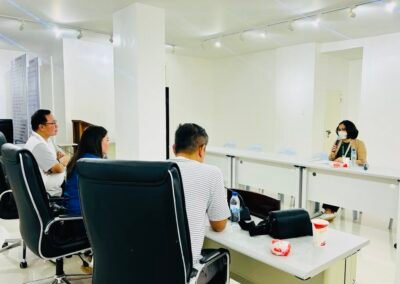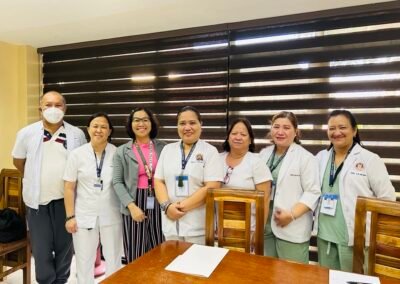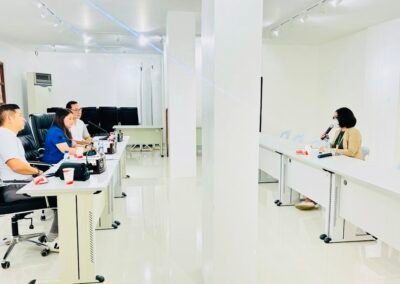Department of Nursing

Program Offering:
- Bachelor of Science in Nursing
Ms. Riza B. Lumagui, RN, MAN, MBA
Dean, College of Nursing
Office Location
Department Chair’s Office, Upper Ground Floor of HED Building
Contact Number
TEL: (046) 419 8500 loc. 206
E-mail
rlumagui@feucavite.edu.ph
The BSN is a four year program consisting of general education and professional courses. Professional courses are threaded through from the first year thru the fourth year with emphasis on the nursing concepts with corresponding Related Learning Experience (RLE). The BSN program provides an intensive nursing practicum that will refine further the nursing competencies to ensure achievement of the BSN program outcomes required of an entry level nurse.

Program Objectives
The BSN program aims to develop a professional nurse who is able to assume entry level positions in health facilities or community settings. The professional nurse is capable of providing safe, humane, quality and holistic care to individuals in varying age, gender and health- illness status; healthy or at risk families; population groups; and community; singly or in collaboration with other health care providers to promote health, prevent illness, restore health, alleviate sufferings and provide end of life care.
Program Expected Learning Outcomes
Upon completion of the program, BSN graduates can:
- Apply knowledge of physical, social, natural and health sciences and humanities in managing clients, teams, and programs in any setting
- Perform safe, appropriate, and holistic care to individuals, families, population groups, and community utilizing nursing process.
- Apply guidelines and principles of evidence-based practice in nursing management.
- Practice nursing in accordance with existing laws, legal, ethical and moral principles.
- Communicate effectively in speaking, writing and presenting using culturally appropriate language to clients and teams.
- Report and document up-to-date client care accurately and comprehensively
- Collaborate effectively with inter, intra-, and multi- disciplinary and multi-cultural teams.
- Practice beginning management and leadership skills using systems approach in the delivery of client care.
- Conduct research with an experienced researcher.
- Engage in lifelong learning with a passion to keep current with national and global developments in general, and nursing and health developments.
- Demonstrate responsible citizenship and pride in being a Filipino.
- Apply techno- Uphold the nursing core values in the practice of the profession intelligent care systems and process in health care delivery.
- Uphold the nursing core values in the practice of the profession
- Apply entrepreneurial skills in the delivery of nursing care.
- Demonstrate the core values of FEUC (Fortitude, Excellence, Uprightness, and Compassion) in the practice of nursing profession.
Career Pathways
A graduate of the BSN program may venture to various professional career paths, including the following:
- Licensed Registered Nurse
- Public Health Nurse
- Clinical Nurse or Hospital Nurse
- Private Duty Nurse
- Nurse Educator
- Researcher
- Medical Transcriptionist
- Nurse Entrepreneur
- Military Nurse
- School Health Nurse
- Occupational Health Nurse
- Health Policy Maker
Program Features
Program curriculum
The program’s curriculum, which is based on the three frameworks: competency, community, and evidence, is the core of its success in producing world class nurses.
Course offerings evolve from a philosophical belief that the goal of nursing is to assist consumers of care to reach their health goals. The nurse uses caring behaviors and the science of nursing to achieve these goals.
The first two years of the program focuses mostly on General Education (GE) courses designed to hone learners’ core competencies such as critical and analytic thinking, oral and written communication skills and independent learning. Using a liberal approach to education, GE courses such as Scholarly Inquiry and Purposive Communication prepare learners for their advanced professional courses and research work required later in the program.
The product then, of FEU’s BSN program, is a nursing leader or a nurse with a potential for leadership who is value driven, a critical thinker, technologically proficient, committed to the profession and who cares very deeply about providing safe, quality, and humane care.
This mission is accomplished through modeling behavior, mentoring, and motivating by faculty members.
The Bachelor of Science in Nursing (BSN) Program prepares graduates to provide and manage client care and to become members of the discipline of Nursing. Graduates are eligible to take the National Licensure Examination given by the Professional Regulations Commission Board of Nursing.
The BSN curriculum at FEU Cavite is structured around a well-defined conceptual framework that integrates general and nursing education. Enhanced by a verdant campus and cutting-edge simulators, the Bachelor of Science in Nursing program provides immersive, hands-on training using advanced simulation tools. This includes a Maternal Care Patient Simulator for a comprehensive birthing experience and a multipurpose nursing skills and CPR life support simulator. These simulators enable students to thoroughly learn care protocols and essential nursing skills, equipping them with valuable experience in managing clients across all age groups in diverse healthcare environments.
Upon completion of the program, students can enroll in the Master of Arts in Nursing (MAN) program, which prepares them for leadership positions in the areas of clinical practice, administration, education, and research.
Well-being and work-life balance is also a key feature of the BSN curriculum. Throughout the program, learners are encouraged to plan their own Wellness and Recreation Program (WRP), a university-wide course which intends to develop their physiological and psycho-social fitness as well as encourage social responsibility and community involvement.
Teaching-Learning Approaches
The BS Nursing program uses various teaching-learning approaches designed to respond to the needs of our students and to empower them as lifelong learners and professionals in the field of nursing and health care. These approaches include the following:
- Student-centered learning
Following the university’s educational philosophy and learning paradigm, the BSN program uses dynamic and collaborative activities and methods which encourage active learning among our students. These include simulation exercises, project supervision, oral presentations and fieldwork, among others.
- Didactic approach
The program recognizes the need to develop the students’ theoretical knowledge in nursing practice and other related health disciplines, which can be facilitated through activities such as lectures, discussions and demonstrations.
- Interdisciplinary approach
The professional courses under BSN allows students to understand and adopt multi-disciplinal lenses from different allied health science fields. Meanwhile, students are also exposed to the humanities and social science disciplines through the liberal structure of the GE curriculum.
- Blended learning
In recognition of fast-paced technological advancements, the program utilizes online virtual classrooms, self-study modules, video presentations and other ubiquitous learning technologies. FEU utilizes Canvas, a world-class learning management system, to facilitate this mode of delivery.
- Problem-based learning
The program adopts the use of case studies, situational analysis and problem-solving tools in developing students’ critical thinking skills.
- Research-based approach
BS Nursing encourages students to develop their research interests and undertake research endeavors in the form of academic papers and presentations throughout their stay in the program. This is designed to nurture their critical thinking skills and inherent curiosity towards scientific inquiry.
Assessment and research work
The BSN program utilizes varied assessments and assessment tasks based on the needs of the students. Under the tenet of academic freedom, teachers and students may freely negotiate their assessment tasks for the course. Teachers are also encouraged to develop relevant formative assessments designed to help learners prepare for capstone summative assessments.
Assessment tools and techniques include summative tests and quizzes, preparation of laboratory reports, case analysis, and practical examinations. Research work is also a common feature among majority of the courses, while the students are also required to perform return demonstration and defend their thesis before they complete the program.
Internship
Students must complete 2,754 hours of internship in nursing graduates, which they may complete in partner institutions and affiliates of the university.
ACTIVITIES and ACHIEVEMENTS
Strengthening Partnerships for Clinical Excellence: FEU Cavite’s Collaborative Efforts in Nursing Education
In preparation for the SY 2024-2025 clinical and community duties of the FEU Cavite 2nd year nursing students, the Department of Nursing led by its Dean, Ms. Riza Bautista-Lumagui,RN,MAN,MBA conducted courtesy visits to key healthcare institutions. These institutions will play a vital role in the hands-on training and professional development of future Tamaraw Nurses. The hospitals visited included FEU Cavite’s base hospital for nursing, South Imus Specialist Hospital Inc., Silang Specialist Medical Center, and the Provincial Government-General Emilio Aguinaldo Memorial Hospital (GEAMH).
During the visit to South Imus Specialist Hospital Inc on August 13, 2024, Dean Riza together with Ma’am Melody D. De La Paz ,RN,MAN (faculty), met with Chief Nurse Ms. April D. Batoy,RN,MAN to discuss collaborative efforts for student training. At Silang Specialist Medical Center, FEU Cavite was warmly received on the said date by Chief Nurse Ms. Dulce Angeles,RN,MAN,MBA , Assistant Chief Nurse Ms. JM Grace Baliguat Ledesma,RN,MAN, and Nurse Training Officer Jozelle Mae Suazo who both expressed their commitment to providing a supportive learning environment for our students.
On September 24, 2024, Dean Riza and Mr. Arnazer D. Gan, RN, MAN, visited the Provincial Government of Cavite – General Emilio Aguinaldo Memorial Hospital in Trece Martires City. They were warmly welcomed by Chief Nurse Ms. Judith, C. Aballa,RN,MAN, Assistant Chief Nurse Ruthie Armijo,RN,MAN, and their team of Nurse Supervisors. During the visit, the team was provided with an insightful overview of the hospital affiliation, highlighting key areas of collaboration for student training and development.
On September 27, 2024, Dean Riza attended a meeting with the Silang Councilors, Hon. Ivee A. Reyes, Hon. Luis V. Batingal Jr., and Hon. Juan Carlo K. Madlansacay to discuss the Memorandum of Agreement (MOA) between FEU and RHU Silang. This partnership will strengthen the community engagement aspect of the students’ training, allowing them to gain valuable experience in public health.
These collaborations will ensure that FEU Cavite BS Nursing students will receive well-rounded and hands-on experience in both hospital and community health settings, fostering their growth as competent and compassionate nursing professionals.
Dean Riza discusses the MOU between FEU Cavite and Silang LGU with Silang Coucilors Hon. Ivee A. Reyes, Hon. Luis V. Batingal Jr., and Hon. Juan Carlo K. Madlansacay






